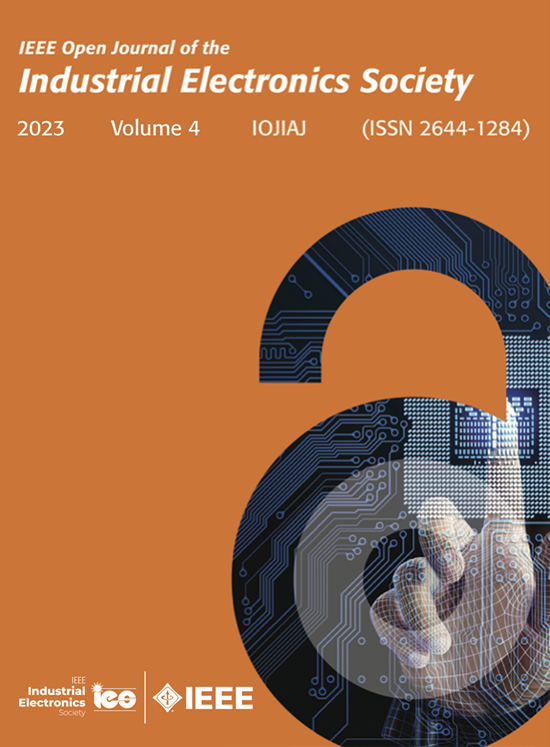电动汽车充电器的增强型逆模型预测控制:整流器侧解决方案
IF 5.2
Q1 ENGINEERING, ELECTRICAL & ELECTRONIC
IEEE Open Journal of the Industrial Electronics Society
Pub Date : 2024-07-30
DOI:10.1109/OJIES.2024.3435862
引用次数: 0
摘要
逆模型预测控制(IMPC)是最近针对电力电子转换器提出的一种控制技术。IMPC 继承了模型预测控制 (MPC) 的优点,能够处理复杂的非线性系统,实现多重控制目标,同时遵守各种约束条件。与 MPC 不同的是,IMPC 省去了成本函数和状态预测的迭代计算,大大减轻了计算负担。不过,IMPC 和 MPC 都非常依赖于功率转换器的动态模型。这使得它们容易受到不确定性和干扰的影响。本文提出了一种新技术,通过将转换器的动态模型视为黑盒,提高电动汽车充电器 IMPC 的可靠性和鲁棒性。然后,提出了一种采用递归最小平方算法的自适应估算策略,用于在线动态模型估算,然后由 IMPC 用于优化开关状态预测。所提技术的主要优点是利用准确和实时估计的动态模型,这有助于 IMPC 进行可靠的状态预测。通过对三相三电平 T 型整流器的大量仿真和实验验证,证明了所提技术的有效性。本文章由计算机程序翻译,如有差异,请以英文原文为准。
Enhanced Inverse Model Predictive Control for EV Chargers: Solution for Rectifier-Side
Inverse model predictive control (IMPC) is a control technique that was recently proposed for power electronic converters. IMPC inherits the advantages of model predictive control (MPC) in terms of ability to handle complex and nonlinear systems and achieving multiple control objectives, while adhering to various constraints. Unlike MPC, IMPC offers a significantly reduced computational burden by omitting the iterative computations of the cost functions and states predictions. Nevertheless, both IMPC and MPC rely significantly on the dynamic model of the power converter. This makes them susceptible to uncertainties and disturbances. This article presents a novel technique to enhance the reliability and robustness of the IMPC for electric vehicle chargers by treating the converter's dynamic model as a black box. Then, an adaptive estimation strategy employing a recursive least square algorithm is proposed for online dynamic model estimation, which is then used by the IMPC for optimal switching states prediction. The key benefit of the proposed technique is the utilization of an accurate and real-time estimated dynamic model, which facilitates a reliable states prediction by the IMPC. The effectiveness of the proposed technique is demonstrated through extensive simulations and experimental validation for a three-phase three-level T-type rectifier.
求助全文
通过发布文献求助,成功后即可免费获取论文全文。
去求助
来源期刊

IEEE Open Journal of the Industrial Electronics Society
ENGINEERING, ELECTRICAL & ELECTRONIC-
CiteScore
10.80
自引率
2.40%
发文量
33
审稿时长
12 weeks
期刊介绍:
The IEEE Open Journal of the Industrial Electronics Society is dedicated to advancing information-intensive, knowledge-based automation, and digitalization, aiming to enhance various industrial and infrastructural ecosystems including energy, mobility, health, and home/building infrastructure. Encompassing a range of techniques leveraging data and information acquisition, analysis, manipulation, and distribution, the journal strives to achieve greater flexibility, efficiency, effectiveness, reliability, and security within digitalized and networked environments.
Our scope provides a platform for discourse and dissemination of the latest developments in numerous research and innovation areas. These include electrical components and systems, smart grids, industrial cyber-physical systems, motion control, robotics and mechatronics, sensors and actuators, factory and building communication and automation, industrial digitalization, flexible and reconfigurable manufacturing, assistant systems, industrial applications of artificial intelligence and data science, as well as the implementation of machine learning, artificial neural networks, and fuzzy logic. Additionally, we explore human factors in digitalized and networked ecosystems. Join us in exploring and shaping the future of industrial electronics and digitalization.
 求助内容:
求助内容: 应助结果提醒方式:
应助结果提醒方式:


